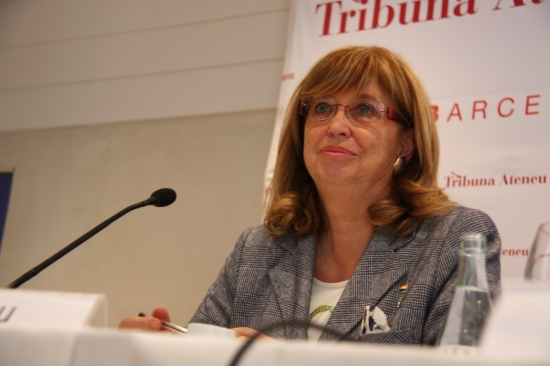01.02.2014 - 11:25
‘The People’s Party (PP) wants to impose the same model in Catalonia that they have in Valencia and the Balearic Islands,’ said Irene Rigau, Catalonia’s Minister of Education with respect to the Supreme Court of Justice (TSJC) ruling that requires five Catalan schools to set the minimum usage of Spanish at 25% of class time. Current Catalan law stipulates that Catalan be the language of instruction in Catalan schools, except for required Spanish language classes.
Rigau added, ‘They want to extend the special treatment recognized by the law for a single student to the entire group and all of the courts had accepted that that is an unimaginable situation, a conflict that we have always tried to avoid in our schools,’ But reactions from the school system and civil society were much more blunt. Somescola, Esquerra, Iniciativa, and the CUP demanded that the Catalan government defend linguistic immersion in the schools against the attacks from the TSJC and to disobey the court’s orders.
In their communiqué, Somescola said that the education model in our country should not be decided through the legal system but that it must be the Parliament of Catalonia who establishes its own legislation, ‘according to the democratic mandate that we Catalans have expressed at the polls’. Somescola rejected the ruling out of hand, and asked the Generalitat to continue to safeguard the Catalan model of linguistic immersion, insisting that ‘the Department of Education is the administrative organ that has jurisdiction over the distribution of class hours and assigning the amount of usage of languages. The TSJC does not have this pedagogic capacity nor this organizational function.’
Somescola.cat—a coalition that organizes civic end educational groups—explains in the same communiqué that next week the group will meet to prepare a response to the TSJC attack and will make a call to the community ‘in order to continue defending the consensus forged over the past thirty years in Catalonia on linguistic immersion, which guarantees equal opportunity and social cohesion in Catalonia.’
Iniciativa, Esquerra, and the CUP demand that the government maintain the linguistic immersion model, irrespective of the TSJC ruling
For its part, ICV’s national coordinator, Dolors Camats, asked the government yesterday to maintain the linguistic immersion model irrespective of what the TSJC ruled. The spokesperson for ICV-EUiA, Joan Mena, expressed the same opinion to the Education Committee, demanding that the government exhaust ‘all legal recourses possible in order to keep the legal impositions from overruling educational criteria.’ Mena stressed that the judges cannot establish percentages without knowing the plurilinguistic reality of the schools and warned that this decision not only tries to undermine the linguistic immersion model but also the principle of autonomy of individual schools.
The spokesperson for Esquerra, Anna Simó, also insisted that the Catalan government defend linguistic immersion to the end, if necessary in the Constitutional Court (TC). Simó underscored that the legal framework in Catalonia is the LEC, which guarantees linguistic competency in both Catalan and Spanish without discriminating against students or separating them into language groups. Given the TSJC ruling, Simón said it was ‘completely unfair that the will of the minority should try to overrule the laws that apply to the majority, and that violate the rights of the other schoolmates, and Catalonia’s legislation.’ ‘There is a minority that wants to exclude Catalan from the model we have agreed on democratically,’ she said. And she stated that ‘a completely orquestrated battle is being fought in the legal system that was already lost at the ballot boxes’.
The member of Parliament for the CUP, Isabel Vallet, was even more clear as she called for disobedience and warned of the ‘Spanishizing offensive’ all around the Catalan Countries and in all areas. She gave a few examples: the Wert law (which centralizes school curriculum in Madrid, and minimizes use of Catalan and Catalonia-related subjects in school), the public administration law, the law of symbols, the elimination of Catalan as the language of instruction in Valencian schools, and the trilingualism decree in the Balearic Islands (which substitutes Spanish for Catalan under the guise of expanding English use). For the CUP, civil and institutional disobedience are key. ‘If we don’t take advantage of the strength of our unity, we will be destroyed as a people,’ said Vallet, paraphrasing the Valencian essayist Joan Fuster.




